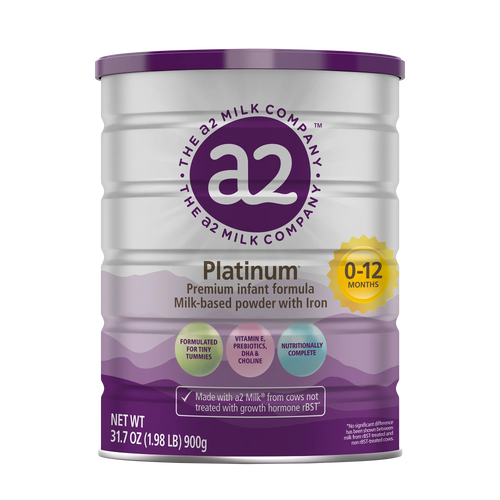Is Goat Milk Formula an Alternative Option?
Navigating the world of infant formula can feel overwhelming. With countless options available, you're not alone in wondering about the differences between goat’s milk and cow’s milk infant formulas.
Parents want to offer the best possible nutrition for their little ones. The composition of infant formula isn’t just a technical detail—it may influence a baby’s comfort and feeding experience.
While all infant formulas must meet FDA standards for safety and nutrition, goat milk and cow milk-based formulas differ in composition, which may affect how well individual babies tolerate them.
In addition to goat milk, some parents explore infant formula made with milk from cows that naturally produce only the A2 protein as a potential alternative to traditional cow milk-based formula. Unlike conventional milk, which contains both A1 and A2 types of beta-casein protein, a2 milk comes from cows that produce only the A2 type. This difference could help explain why many parents have successfully made the switch to an A2 protein-based cow's milk formula.
Understanding these distinctions can help you make informed choices that align with your baby’s needs.
When choosing a formula, milk source should also be a part of an infant formula decision. a2 Platinum® uses milk from cows that naturally produce only the A2 protein. With over a decade of experience in infant nutrition, it offers parents a carefully developed option they can feel confident in.
Why Milk Source Matters for Your Baby
The milk source used in infant formula plays a role in shaping its nutritional profile. Different milk sources can offer subtle variations in nutrients and digestibility, which may influence your baby’s feeding experience.
Over time, advancements in dairy farming have contributed to changes in how milk is produced and processed. Some heritage cow breeds, for example, may yield milk with characteristics that differ from those of high-production breeds commonly used today. For example, milk from A2 cows naturally lacks the A1 beta-casein protein found in most conventional cow milk.
Recognizing these differences has led some parents to explore alternative options. Some infant formula manufacturers place special emphasis on sourcing practices and ingredient integrity, with milk selection becoming a key area of focus. This often includes:
- Sourcing milk with consistent composition to help ensure nutritional reliability
- Utilizing advanced testing methods to support quality and safety standards
- Partnering with farms that follow specific breeding and animal care practices
- Using processing techniques designed to preserve naturally occurring components
These considerations can help support consistency, safety, and nutritional integrity in the final product. Choosing a formula from a brand that prioritizes sourcing may offer added reassurance when making a formula decision.
Goat Milk vs Cow Milk Formula Key Differences
One question parents may ask is whether goat milk formulas offer any advantages over traditional cow milk formulas. Both provide complete nutrition, but their natural compositions vary in ways that may affect how babies digest and tolerate them.
Goat milk naturally contains smaller fat globules compared to cow milk. Research published in the Journal of Dairy Science shows these structural differences exist at the molecular level. Goat’s milk contains lactose. However, its lactose content is lower than that of cow’s milk.
Goat’s milk is comprised of about 4.20% lactose, whereas cow’s milk contains almost 5%.
Goat and cow milk both include whey and casein proteins, but the difference in structure makes goat milk easier for many babies to digest. However, all infant formulas—whether made from goat or cow milk— are formulated to meet strict nutritional guidelines for babies.
Both goat milk and cow milk infant formulas are fortified to ensure they meet the nutritional needs of infants. However, their natural characteristics differ in several ways:
Goat Milk Formula naturally provides:
- Smaller fat globules may affect digestibility and absorption. (Source)
- A higher proportion of medium-chain fatty acids compared to cow's milk. (Source)
- Lower lactose content than cow's milk in its natural state. (Source)
- Distinct protein composition, including differences in casein fractions, from cow milk. (Source)
Cow Milk Formula offers:
- Extensively researched nutritional profiles.
- Long history of successful use in infant nutrition.
- Consistent nutritional profiles across manufacturers.
Not All Cow Milk Formulas Are the Same
Just as goat milk has natural distinctions, cows that naturally produce only the A2-type protein also offer a unique protein profile. While most traditional cow milk formulas contain both A1 and A2 beta-casein proteins, some formulas, like those made with a2 Milk®, are crafted using milk from cows that naturally produce only the A2 protein. This difference could help explain why many parents have successfully made the switch to an A2 protein-based formula as an alternative protein option.
Whether choosing goat milk, traditional cow milk, or an A2 protein-based cow’s milk formula, understanding these differences can help you find the right fit for your baby’s unique needs.
Understanding Formula Types and Options
There are a range of milk-based infant formulas available, each developed to support unique nutritional needs and feeding goals. Cow’s milk-based formula remains the most extensively researched option available. Decades of clinical trials and studies support its safety and effectiveness for infant nutrition.
The American Academy of Pediatrics recognizes cow milk infant formula as a suitable alternative when breast milk isn't available. This extensive research foundation provides confidence for parents choosing traditional options.
All infant formulas sold in the U.S. are required to contain at least 29 essential nutrients carefully balanced to support infant development. Modern manufacturing processes help ensure consistent nutritional completeness and quality across formula types.
Goat milk-based formula has gained attention for its unique characteristics. The naturally smaller fat globules may offer different absorption patterns compared to cow milk formula.
Goat milk infant formula undergoes similar fortification processes as cow milk-based formula. Manufacturers must meet the same regulatory standards for nutritional adequacy and safety.
The protein composition in goat milk-based infant formula differs from cow milk options, though both provide complete amino acid profiles necessary for growth.
Certain infant formulas represent innovative approaches to nutrition, combining carefully selected milk sources with advanced manufacturing techniques.
When choosing a formula, features like these are worth considering and a2 Platinum® includes them all, helping you feel confident in your baby’s nutrition:
- Made with a2 Milk® from carefully selected milk sources.
- Clean Label Project Purity Award certification for independent quality verification.
- Non-GMO ingredients without genetically modified components.
- No Palm Oil formulation, avoiding palm oil ingredients.
- Designed with attention to quality and nutritional completeness
Making Your Formula Decision
Choosing between goat milk and cow milk formula requires careful consideration of your baby's individual needs and your family's preferences.
Your pediatrician plays a crucial role in helping select the right formula. They can provide personalized recommendations tailored to your baby’s specific needs and developmental patterns. Regular check-ups enable the monitoring of your baby’s growth and nutritional status, ensuring the chosen formula supports healthy development.
Several important factors should guide your decision when choosing between formula types:
- Consider protein type - some parents explore goat milk-based formulas or formulas made with milk from cows that produce only the A2 protein as a potential alternative when traditional cow milk formula isn’t well tolerated.
- Nutritional requirements, which all FDA-approved formulas must meet, though premium options may offer additional benefits
- Availability and consistent access to your chosen formula in your area
- Budget considerations, since premium formulas may cost more but may provide additional benefits
- Monitoring your baby’s individual response to different formulas
These factors help ensure you select the most appropriate formula for your family’s unique circumstances.
Understanding formula labels is key to making informed comparisons. Look for quality indicators that demonstrate manufacturing excellence and ingredient sourcing.
If you decide to switch from cow milk-based to goat milk-based formula (or vice versa), do so gradually and under healthcare guidance. Monitor your baby’s response during the transition, keeping detailed notes on feeding patterns, growth milestones, and any observations to discuss with your pediatrician. This careful documentation helps ensure optimal nutrition throughout the transition period.
Why Do Some Parents Explore Goat Milk Formula?
Some parents consider goat milk-based formulas when their baby experiences sensitivities with traditional cow milk-based options. Goat milk naturally has a different protein structure and slightly less lactose than cow milk, which may affect how some babies digest it.
It’s important to know that goat milk formula is not suitable for babies with a confirmed cow milk protein allergy, since the proteins are similar enough to cause cross-reactions.
Like all formulas sold in the U.S., goat milk-based options must meet strict FDA standards to ensure they provide complete nutrition for infants.
In addition to goat milk, some families also explore formulas made with milk from cows that naturally produce only the A2 protein. These formulas provide another option for parents seeking alternatives to conventional cow milk-based formula.
Supporting Your Baby's Nutritional Journey
The world of infant nutrition continues evolving, offering parents more choices than ever before. Whether you choose goat milk or cow milk-based formula, understanding the science behind these options empowers better decision-making.
In addition to goat milk, some parents explore cow milk formulas made with milk from cows that naturally produce only the A2 protein. Options like a2 Platinum®, combine more than a decade of experience in infant nutrition with milk from cows that naturally produce only the A2 protein. This difference could help explain why many parents have successfully transitioned to an A2 protein-based formula, which is made from milk from cows that naturally produce only the A2 protein, offering an alternative protein option for families.
Your baby's nutritional needs are unique and individual. What works well for one baby might not be the best fit for another, which is why a personalized approach matters. Feeding choices can be complex, but staying informed helps you feel confident in supporting your baby’s needs.






